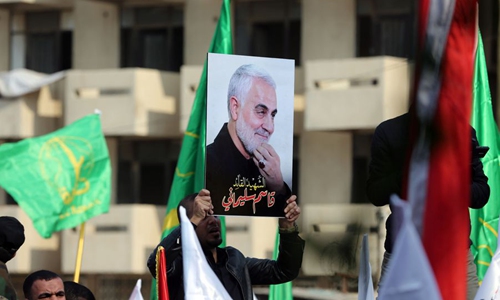UN expert deems US drone strike on Iran’s Soleimani ‘unlawful’ killing
Source: Reuters Published: 2020/7/7 18:03:40

A group of mourners holding pictures of top Iranian commander Qassem Soleimani in Baghdad, Iraq on Saturday. Photo: Xinhua/Khalil Dawood
The January US drone strike in Iraq that killed top Iranian general Qassem Soleimani and nine other people represented a violation of international law, a UN human rights investigator said on Monday.
The US has failed to provide sufficient evidence of an ongoing or imminent attack against its interests to justify the strike on Soleimani's convoy as it left Baghdad airport, said Agnes Callamard, UN special rapporteur on extrajudicial, summary or arbitrary executions.
The attack violated the UN Charter, Callamard wrote in a report calling for accountability for targeted killings by armed drones and for greater regulation of the weapons.
"The world is at a critical time, and possible tipping point, when it comes to the use of drones. ... The Security Council is missing in action; the international community, willingly or not, stands largely silent," Callamard, an independent investigator, told Reuters.
Callamard is due on Thursday to present her findings to the Human Rights Council, giving member states a chance to debate what action to pursue. The US is not a member of the forum, having quit in 2018.
Soleimani, leader of the Revolutionary Guards' Quds Force, was a pivotal figure in orchestrating Iran's campaign to drive US forces out of Iraq, and built up Iran's network of proxy armies across the Middle East. Washington had accused Soleimani of masterminding attacks by Iranian-aligned militias on US forces in the region.
"Major General Soleimani was in charge of Iran military strategy, and actions, in Syria and Iraq. But absent an actual imminent threat to life, the course of action taken by the US was unlawful," Callamard wrote in the report.
The January 3 drone strike was the first known incident in which a nation invoked self-defense as justification for an attack against a state actor in the territory of a third country, Callamard added.